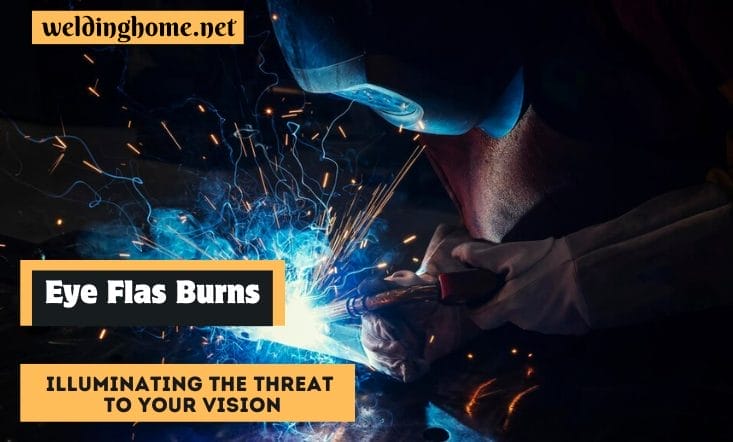Eyes Flash Burns: Illuminating the Threat to Your Vision

Most people underestimate flash burns, which may injure the soul portals and the eyes. This article discusses Eyes Flash Burns: Illuminating the Threat to Your Vision? These are welder’s eye or photokeratitis burns. These symptoms emerge when someone is exposed to ultraviolet (UV) light from welding arcs, equipment, torches, flashbulbs, and sunlamps.
Flash burns are sometimes called photochemical retinopathy or retinal photocoagulation. Prolonged exposure to intense light causes this damage. Welding, arc flashes, lightning, and solar radiation are common flash burn causes. Damage to the retina, the light-sensitive tissue behind the eye.
Symptoms of Flash Burns

Symptoms of flash burns can vary depending on the severity of the injury. Symptoms may include:
- The vision is hazy.
- The ability to detect light
- Being able to see areas of darkness or flashes of light..
- Discomfort in the eyes
- What Gives Rise to Flash Burns
Signs and Symptoms of Hot Flashes
Exposure to brilliant light may result in the development of flash burns. One of the most prevalent causes of flash burns is the following.
- Welding: The welding process generates powerful ultraviolet (UV) radiation that has the potential to cause damage to the retina.
- Arc flashes are electrical discharges that create brilliant light and tremendous heat. Arc flashes are often described as “arc flashes.”
- Lightning strikes: Lightning strikes not only create a burst of electricity but also an extremely brilliant light, both of which have the potential to cause damage to the retina.
- Light from the sun: Excessive exposure to ultraviolet light from the sun might damage the retina.
Read more: What Is SMAW (Stick Welding) & How Does It Work?
Preventing Burns Caused by Flashes
Flash burns are best avoided by using protective eyewear in bright light. Different light sources need different protective eyewear. Welders should wear helmets with goggles, electricians should wear safety glasses with arc flash protection, and outdoor workers should wear UV-blocking sunglasses.
Treatment for Flash Burns
Flash burns have no cure, although therapy may minimize symptoms and prevent retinal damage.
- Treatment may include:
- Rest: Eye rest helps the retina repair.
- Pain medication: OTC painkillers may ease pain.
- Reduce inflammation and swelling using eye drops.
- Surgery: Retinal impairment may need surgery.
- Artificial tears: Artificial tears moisturize and prevent dry eyes.
- Eye drops: Inflammation and edema may be treated with eye drops.
- Patch: Some people wear patches to shield their eyes from light.
Before applying eye drops/ointments:

- Be sure to soap and rinse your hands.
- Do not contact the dropper tip of an eye drop bottle with your eye or any surface.
- Do not contact the ointment applicator tip to your eye or other surface.
- Remove contact lenses before using eye drops or ointments. After administering eye drops or ointments, wait 15 minutes before reweaving contacts.
Read more: Arc Welding Explained: What Is It & How Does It Work?
Eye drop usage:
- Turn slightly back.
- Pull your lower eyelid with your index finger.
- Hold the dropper or applicator tip of eye drops or ointments above your eye.
- Look up and press the dropper or applicator tip to release drops or ointment into your lower eyelid pocket.
- Do not blink until you squeeze the drops or ointments.
- If applying eye drops, gently shut your eye for a few minutes.
- To distribute ointments, softly shut your eyes and push on the inner corner.
After eye drops/ointments:

- Do not touch your eyes.
- Dry hands with a fresh tissue.
For a flash burn, get urgent medical attention right away.
Flash burns are a kind of eye damage brought on by exposure to strong ultraviolet (UV) radiation. They are sometimes referred to as photokeratitis or welder’s flash. The most frequent causes of flashburns include sun radiation, welding fumes, arc flashes, and lightning strikes. The transparent front surface of the eye, the cornea, can be harmed by flash burns,
- hazy vision
- Light Sensitivity
- seeing patches of blackness or bursts of light
- sensation in the eyes
- Headache
- emesis
After a flash burn, taking care of oneself at home is important.
Flash burns are UV-induced eye injuries, sometimes called welder’s flash or photokeratitis. Welding, arc flashes, lightning, and UV radiation can cause them. Flash burns can permanently impair eyesight.
See an eye doctor promptly if you suspect a flash burn. Complications can be reduced by early identification and treatment.
- Put your eyes back. Resting your eyes is the greatest method to help them recuperate. Steer clear of screen-intensive activities like TV watching and reading.
- Put on fake tears. Artificial tears can lessen dryness and moisturize your eyes. Most pharmacies sell fake tears over the counter.
- Put on some sunglasses. Sunglasses can shield your eyes from UV radiation, which might aggravate them even more.
- Refrain from rubbing your eyes. Rubbing your eyes might exacerbate the discomfort and raise the possibility of infection.
- Avoid using contact lenses. The accumulation of grit and debris in contact lenses can exacerbate eye irritation.
- Make sure you get enough rest. Sleep is not only beneficial to your general health but also to the healing of your eyes.
Get assistance where!
If you or someone you know has sustained a flash burn, kindly seek medical assistance immediately. Serious consequences can be avoided with early identification and treatment.
Here are some resources that can help:
- In an emergency, dial 9-1-1 in the United States or triple zero (000) in Canada. Your physician or the hospital’s emergency department closest to you.
- Dr. of Ophthalmology
- The chemist
- The optometrist
- For general inquiries, please get in touch with WorkSafe Victoria at the following numbers: (03) 9641 1444 or 1800 136 089 (toll-free).
- The WorkSafe Victoria Emergency Response Line may be reached at the following number: 13 23 60. This number is available seven days a week, twenty-four hours a day.






